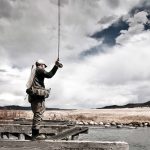The stimulus plan signed by President Obama on February 13, formally known as the “American Recovery and Reinvestment Act of 2009” brings with it $787 billion worth of directed spending, appropriations and intended tax relief for Americans. Roughly $3 billion of that total is intended solely for use in the outdoor industry.
“Its pretty significant for the industry in several ways,” remarked OIA Vice President of Government Affairs Amy Roberts. “Theres a total of around $3 billion for public lands funding; about $2 billion would go to national parks, land management [And] about $1 billion to the U.S. Forest Service.”
Roberts said the money will have a great impact on park facilities that desperately need maintenance, including eroding trails, outdated signs and more. Theres even a provision in the plan that sets money aside specifically for fire control within the Forest Service.
“[This brings a] huge cash infusion into public lands I think well see [results] rather quickly,” said Roberts. And theres no doubt that we will the bill dictates that the $3 billion allocated to outdoor projects must be used or committed to projects within 18 months. “Were going to see right away noticeable changes at these facilities, changes recreationalists will notice during their camping experience.”
Some of these improvements are already in the works. “My understanding is regional forests have already submitted their list of projects to [the] national office and the chief will pick from the projects The list has to be submitted to the White House by March 3.”
Paul Fish, president of Mountain Gear, Inc. remarked that hed love to see the money used to make those improvements, and that “its our job as an industry to try to push it towards non-motorized recreation.”
Aside from the money set aside for outdoor improvements, the stimulus package includes several plans for small businesses; including hiring incentives and the opportunity to pay off current debt with a loan to be paid off in five years. “From a small business side there are a number of [incentives],” said Fish. “Theres some hiring incentives in there thatll allow us to look at people who are younger and unproven without that you might not take the risk on because theyre unproven.”
Aside from the money set aside for outdoor improvements, the stimulus package includes several plans for small businesses; including hiring incentives and the opportunity to pay off current debt with a loan to be paid off in five years. “From a small business side there are a number of [incentives],” said Fish. “Theres some hiring incentives in there thatll allow us to look at people who are younger and unproven without that you might not take the risk on because theyre unproven.”
For each unemployed military vet or “disconnected youth” someone between the ages of 16 and 25 who hasnt attended school or had regular employment in the past six months hired by a small business, the stimulus offers a tax credit to the company of $2,400 per worker. Fish remains hopeful the industry will see this as an opportunity to expand business when theyre able to with fresh employees instead of switching out current employees for new ones in order to get the credit.
“It doesnt do any good to release a good employee to hire one where you get $2,400,” he insists. “You have to grow your business to hire new folks For us the key has been to use our people wisely and more effectively if I use this to decrease my headcount, thats kind of counter You have treat people as a sustainable resource.”
In addition to the employee credit, the package introduces “small business stabilization financing,” which gives business up to $35,000 that can be used to pay off up to six months of payments on previously existing loans. Interest on these stabilizations loans wont have any payment due for a year and must be repaid within five years.
This stabilization appears to be a double-edged sword: it could save some businesses while putting others even further in debt. “[Its an] opportunity for some businesses to save their bacon,” remarked Fish, “But Id be loathe to borrow money just because it was out there unless I had a really good intent.”
The stimulus also brings with it the opportunity for businesses to get micro loans of up to $35,000. “Whats interesting is I talked to a few people who are out of work some are talking about going back to school and some are talking about taking long vacations [in the outdoors] and some are talking about starting up their own business,” he reflected. “Now might be a good time to start up a small business because you can find very favorable rates.”
But aside from the money going towards the outdoor sector and the loan provisions, Fish thinks the biggest impact the bill will have on the outdoor industry will result from the home financing loans. “It potentially has the biggest effect,” he remarked. “[This bill is] the first thing Ive seen where were saying hey, were going to keep people from losing their homes It restores my customers willingness to spend money.”















